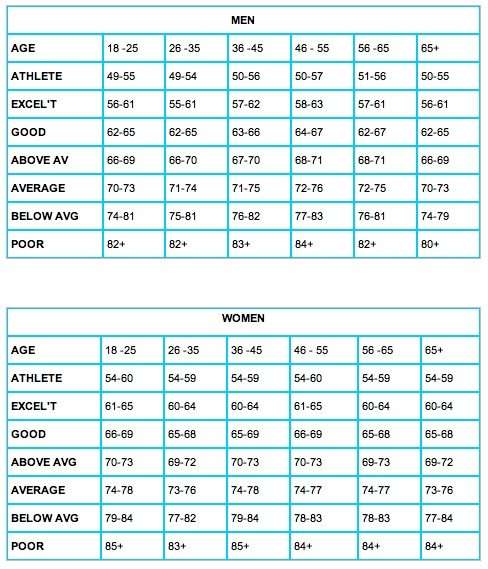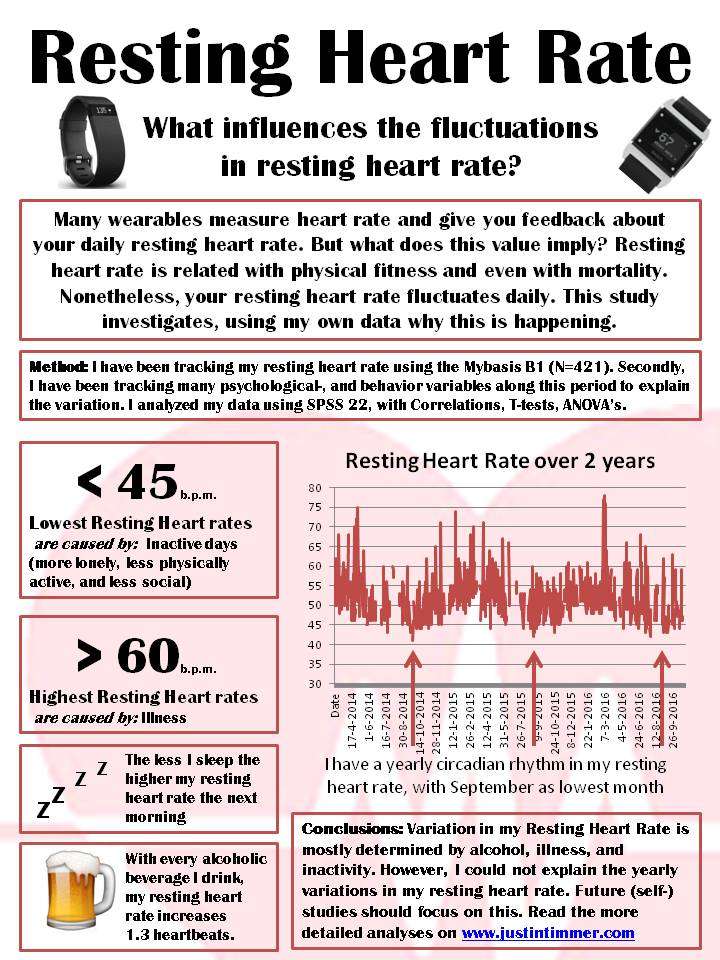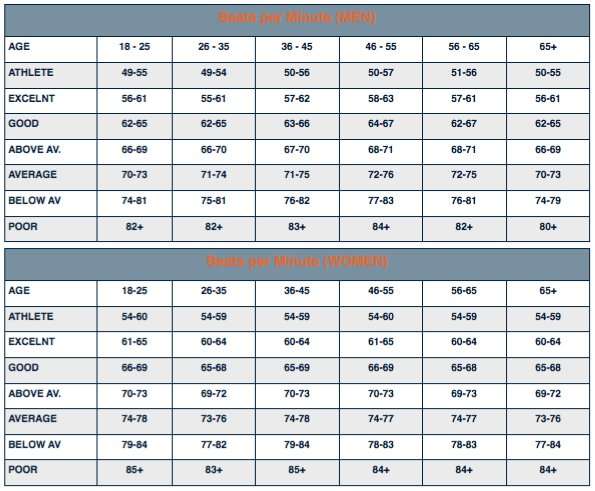What Should Your Resting Heart Rate Be
Out of all the health stats to keep your eye on, your resting heart rate might feel like one of the more boring ones.
Seeing your heart rate rise while you’re exercising can be a confidence boost, letting you know you’re getting a good workout in. Checking it when your heart feels like it’s beating out of your chest is a fun reminder of just how anxiety-inducing some everyday situations can be like going on a first date or watching sports.
But when you’re just sitting down binge-watching some TV or typing away at your computer checking your resting heart rate can feel…anti-climactic.
And yet, it’s important to do now and then. A healthy heart is a strong heart, after all.
“Monitoring your resting heart rate is important because it can help provide clues about your overall heart health. For instance, a consistently high resting heart rate can be a sign that your heart isn’t working as efficiently as it could be. In some cases, it can even be a sign of an underlying heart condition,” explains Dr. Bindu Chebrolu, cardiologist at Houston Methodist.
Plus, one of the benefits of knowing your resting heart rate is that there are ways to lower it if it is too high.
Things Your Resting Heart Rate Can Tell You
Youre Not Active EnoughA normal resting heart rate for the average adult is 60 to 100 beats per minute or 40 to 60 bpm for highly conditioned athletes.If youre sedentary most of the day, your RHR likely approaches or exceeds the top end of this range. This may be because your heart is less efficient. The good news? By regularly engaging in moderate to vigorous aerobic activities , you will help your heart become more efficient at pumping blood, plus you might shed a few pounds, all of which will lower your resting heart rate over time. Even modest reductions in resting heart rate can dramatically reduce your risk of cardiovascular disease and add years to your life!
Youre OvertrainingWhile pushing your body can lead to great gains, it can also be detrimental. If you notice an increase in your resting heart rate when youre going heavy on the training and light on the rest, your body may be telling you that you need to scale back. By giving it the proper rest it needs, your body can repair and adapt and you may bounce back stronger than ever.
Youre Sleep DeprivedAlways exhausted? Chronic sleep deprivationwhich can lead to fatigue, a lower metabolism, and extra snackingcan also raise your resting heart rate. Aim for at least 7 hours of sleep each night.
Normal Resting Heart Rate For Kids
Childrens heart rates are normally faster than those of adults. According to Cleveland Clinic, the normal resting heart rate for a child aged six to 15 is between 70 to 100 beats per minute.
Many factors can affect your resting heart rate, including your level of physical activity. In fact, highly trained athletes can have a resting heart rate of around 40 beats per minute!
Other factors that can affect resting heart rate include:
- Age. You may find that your resting heart rate decreases as you get older.
- Temperature. Your heart rate may increase slightly when youre exposed to hot temperatures.
- Medication side effects. For example, medications such as beta-blockers can lower your resting heart rate.
- Emotions. If youre anxious or excited, your heart rate may increase.
- Weight. People who are obese may have a higher resting heart rate. This is because the heart has to work harder to supply the body with blood.
- Body positioning. Heart rate can increase temporarily when you move from a sitting to a standing position
- Smoking. Smokers tend to have a higher resting heart rate. Quitting smoking can help bring it back down.
You May Like: How Does Heart Disease Affect The Skeletal System
How To Lower Resting Heart Rate
How Slow Is Too Slow

Doctors consider a heart rate below 60 beats per minute as low, Dr. Baez-Escudero says.
If you have bradycardia, youll have a sustained heart rate below 60 even when youre awake and active. A normal range is from 60 to 100 beats-per-minute while awake. The heart rate can also slow down normally while we are asleep to 40 to 60 beats a minute.
Don’t Miss: Does Benadryl Lower Heart Rate
How To Find Your Target Heart Rate
First, it helps to know your resting heart rate, Martin says. Find your pulse . Then count the number of beats in a minutethats your resting heart rate. The average resting heart rate is between 60 and 100, he says. The more fit you are, the lower your resting heart rate for very fit people, its in the range of 40 to 50 beats per minute.
Target heart rate is generally expressed as a percentage of your maximum safe heart rate. The maximum rate is based on your age, as subtracted from 220. So for a 50-year-old, maximum heart rate is 220 minus 50, or 170 beats per minute. At a 50 percent exertion level, your target would be 50 percent of that maximum, or 85 beats per minute. At an 85 percent level of exertion, your target would be 145 beats per minute. Therefore, the target heart rate that a 50-year-old would want to aim for during exercise is 85 to 145 beats per minute.
But theres an easier way to figure it out if you want to skip the math: Wear a fitness tracking device, or exercise on a treadmill or other machine that calculates target heart rate for you, Blaha suggests.
What Can Resting Heart Rate Readings Indicate
Resting heart rate is an indicator of fitness and general health. They are:
- In adults, a lower heart rate is correlated with a higher degree of fitness and a lower incidence of cardiac events, such as heart attacks.
- Highly trained athletes can have an RHR as low as 40. This may be because the lower rate translates to a heart muscle that is stronger and can pump blood more efficiently. Another explanation is that with vigorous exercise, there is the release of nitrous oxide in the hearts blood vessels, which increases the blood supply to the heart.
- However, a consistently higher heart rate has been associated with cardiovascular issues and premature death.
- A 2013 research that studied 3000 men for 16 years found that men with RHR greater than 90 were associated with triple the risk of death when compared to men with RHR below 80.
- An observational study conducted in Norway that looked at 20,000 participants found similar results, even when controlled for factors, such as body mass index and life.
Also Check: Fitbit Charge 2 Heart Rate Accuracy
How Do I Take My Heart Rate
There are a few places on your body where itâs easier to take your pulse:
- The insides of your wrists
- The insides of your elbows
- The sides of your neck
- The tops of your feet
Put the tips of your index and middle fingers on your skin. Press lightly until you feel the blood pulsing beneath your fingers. You may need to move your fingers around until you feel it.
Count the beats you feel for 10 seconds. Multiply this number by six to get your heart rate per minute
Foods That Lower Resting Heart Rate
People in the Blue Zones, areas where people live longer than average, eat plenty of beans. One reason beans are so healthy is that they can help lower your pulse.
In one study, participants were given a cup a day of beans, chickpeas, or lentils. Participants lowered their resting heart rate from an average of 74.1 to 70.7, a 3.4 point drop. The change was similar to those in the other study who exercised for 250 hours!
You might consider eating beans regularly to keep your resting heart rate in a healthy range. Beans are also an excellent source of vegan protein.
Read Also: What Is A Dangerously High Heart Rate When Exercising
Things Your Resting Heart Rate Can Tell You About Your Health
Your resting heart rate is a number you may not think about very often. But what if I told you its one of the most important numbers you should know. Not only can your resting heart rate be used to track your fitness level and target your workouts, but it can also alert you to a variety of potential health issues. So get to know your resting heart rateand whats normal for youthrough the Fitbit app and then learn how it can help inform your health.
What Are Heart Palpitations
A heart palpitation is when you suddenly become aware of your heart beating, usually in an irregular way. Sometimes you can feel it in your ears or your chest when youre lying down. Your heart beat may feel:
- too fast or slow
- like its fluttering
- like its thudding, or pounding.
It is not unusual to feel heart palpitations occasionally and mostly they are harmless. However if youre experiencing them on a regular basis, see your doctor.
Don’t Miss: Does Tylenol Increase Heart Rate
Heart Rate Tips To Keep In Mind
- Start at your beginning. Before getting overly concerned about your heart rate, Martin says, its best to simply get moving. If you havent exercised much before, start where youre comfortable and gradually exert yourself more over time.
- Listen to your body. Your body provides other indicators of how hard its working that you need to consider along with heart rate. Pay attention to how hard youre breathing or sweating, and stop if you feel very uncomfortable, Martin says. Devices recording your heart rate have been known to malfunction, for exampleanother reason listening to your body is important.
- Remember that target heart rate is just a guide. Dont get overly fixated on numbers, Martin says. Ideally, they just push you to work a little harder.
What Your Heart Rate Can And Cant Tell You About Your Health

Before the rise in popularity of fitness trackers and smartwatches, cardiologist Sadiya Khan said patients rarely came in with questions about why their heart rates seemed high or low. But the growing interest in wearable devices, which some early research suggests can even detect coronavirus symptoms, means many people have a trove of real-time health information at their fingertips.
I see a lot more people asking about heart rate because you can track it, you can monitor it, you can make pretty graphs on your Apple Watch, said Khan, an assistant professor of medicine at Northwestern Universitys Feinberg School of Medicine.
But while your heart rate can be a key indicator of your health, Khan and other experts emphasized that it is just one piece of the puzzle.
Its a place to start, said Seth Martin, a cardiologist and associate professor of medicine at Johns Hopkins. If thats your entry into thinking about ones health, then thats great. But your heart rate cant tell you everything you need to know about your health, he added, and it is important not to fixate on that one measure.
Don’t Miss: Can Flonase Cause Heart Palpitations
What Does A High Resting Heart Rate Mean
Just as a low RHR is a sign of a stronger heart, a high resting heart rate may signify a weaker heart muscle. Research indicates that in the long-term, an elevated RHR likely adds to the risk of mortality.
In the short-term, the following factors can increase resting heart rate:
- Strenuous exercise or overtraining
How To Measure Heart Rate
Measuring your heart rate is easy to do if you follow some simple steps. The easiest place to measure your heart rate is on your wrist, just below the base of the thumb. Place your index and middle fingers between the bone and tendon at the base of your thumb. Once you feel your pulse, count the number of beats you feel in 15 seconds. Once youve counted how many pulses, youll multiply that number by four. This gives you the total amount of times your heart beats in one minute. For example, if your heart beats 18 times in 15 seconds, your heart rate is 72 beats per minute.
Its important to measure your heart rate when youre in a relaxed state. If you take your pulse after any strenuous activity, you wont get an accurate reading. You should wait for one to two hours after exercising to take your resting heart rate, and an hour after consuming caffeine, according to Harvard Health.
You May Like: Does Benadryl Lower Heart Rate
What Is Target Heart Rate
Your target heart rate is a range of numbers that reflect how fast your heart should be beating when you exercise. A higher heart rate is a good thing that leads to greater fitness, says Johns Hopkins cardiologist Michael Blaha, M.D., M.P.H. During exercise, you can monitor heart rate and try to reach this target zone. Doctors also use target heart rate to interpret the results of a cardiac stress test.
What Is A Normal Exercising Heart Rate
To determine what a normal exercising heart rate is, you first need to determine your age-predicted maximal heart rate. Here is the generalized equation for predicting maximal heart rate in healthy adults:
HRmax = 208
For example, a 20-year-old person, the age-predicted maximal heart rate would be 194 beats per minute and for a 65-year-old person, the age-predicted maximal heart rate would be 163 beats per minute. A simplified age-predicted maximal heart rate equation is commonly used, but it overestimates maximal heart rate in young adults and increasingly underestimates the maximal heart rate in older adults.
You May Like: Why Do Av Nodal Cells Not Determine The Heart Rate
Exercise And Heart Rate
Like any other muscle, your heart needs exercise to keep it fit and healthy. Regular exercise can help reduce your risk of heart disease and other health conditions, such as diabetes.
To keep your heart healthy, you should aim to do 150 minutes of low to moderate intensity exercise a week. If you have a heart condition, talk to your doctor about what exercise and target heart rates are safe for you.
One way to measure the intensity of your exercise is by using your heart rate. To exercise at a low to moderate intensity your heart rate should be at 50 to 70% of your approximate maximum heart rate.
The easiest way to get an approximate maximum heart rate is to calculate 220 your age. You then need to calculate 50 to 70% of your MHR.
For example, if you’re 40-years-old:
- your approximate maximum heart rate is: 220 40 = 180 beats per minute
- 50% of your MHR is 180 X 0.5 = 90 bpm
- 70% of your MHF is 180 X 0.7 = 126 bpm.
Alternatively, you can use our heart rate chart below to get a rough idea.
Remember if you’re on medications to slow your heart rate down, you may not be able to meet these upper heart rates and the aim should be to exercise at a rate that makes you lightly puff.
Why Is My Resting Heart Rate Decreasing
As mentioned above, a low resting heart rate is often a sign that youre in peak physical fitness. However, in some cases, a low RHR could cause you to feel dizzy or exhausted. If youre experiencing these symptoms and are wondering why is my resting heart rate going down, then you should speak to a doctor. Its also good to remember that medications like beta-blockers are designed to slow your pulse down as they block adrenaline. So always be mindful of what prescription drugs you are taking and how they could be affecting your RHR.
You May Like: How Accurate Is Fitbit Charge 2 Heart Rate
Slow Heart Rate Questionnaire
Heart attacks occur because of a decrease in blood flow to the heart. This is caused by a blockage in one of the hearts major blood vessels. In about 15% to 25% of heart attacks, the blood vessel thats blocked also supplies oxygen to your hearts electrical system. When the heart doesnt get enough oxygen, you may experience a slow heart rate.
Call 911 or go to the ER right away if you suspect youre having a heart attack. Treatment depends on the severity of the heart attack. It may include a combination of medications, stents , and surgery.
Treating a heart attack usually restores normal heart rate. However, a small percentage of people may need to get a pacemaker to control their heart rate.
Resting Heart Rate Chart By Age And Gender

A resting heart rate chart shows the normal range for resting heart rate by age and physical condition. Athletes, those who are physically active, tend to have a lower RHR than those who are less active.
The average heart rate generally increases with age. But many factors determine your heart rate at any moment. These factors include the time of day, your activity level, and your stress level.
You May Like: How To Calculate Target Heart Rate Zone
